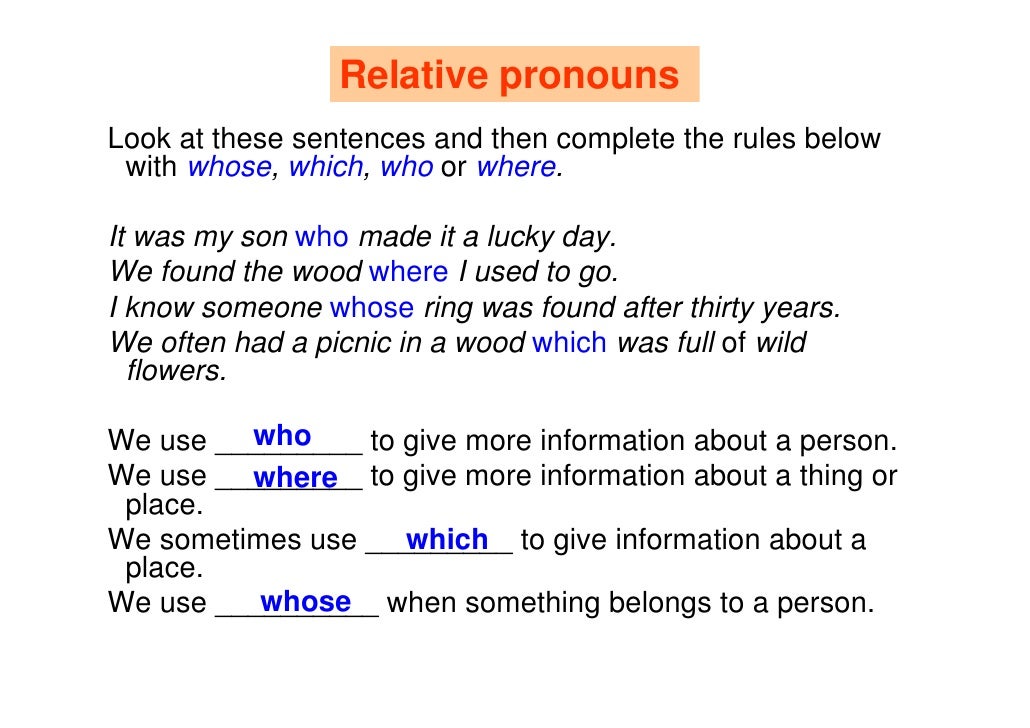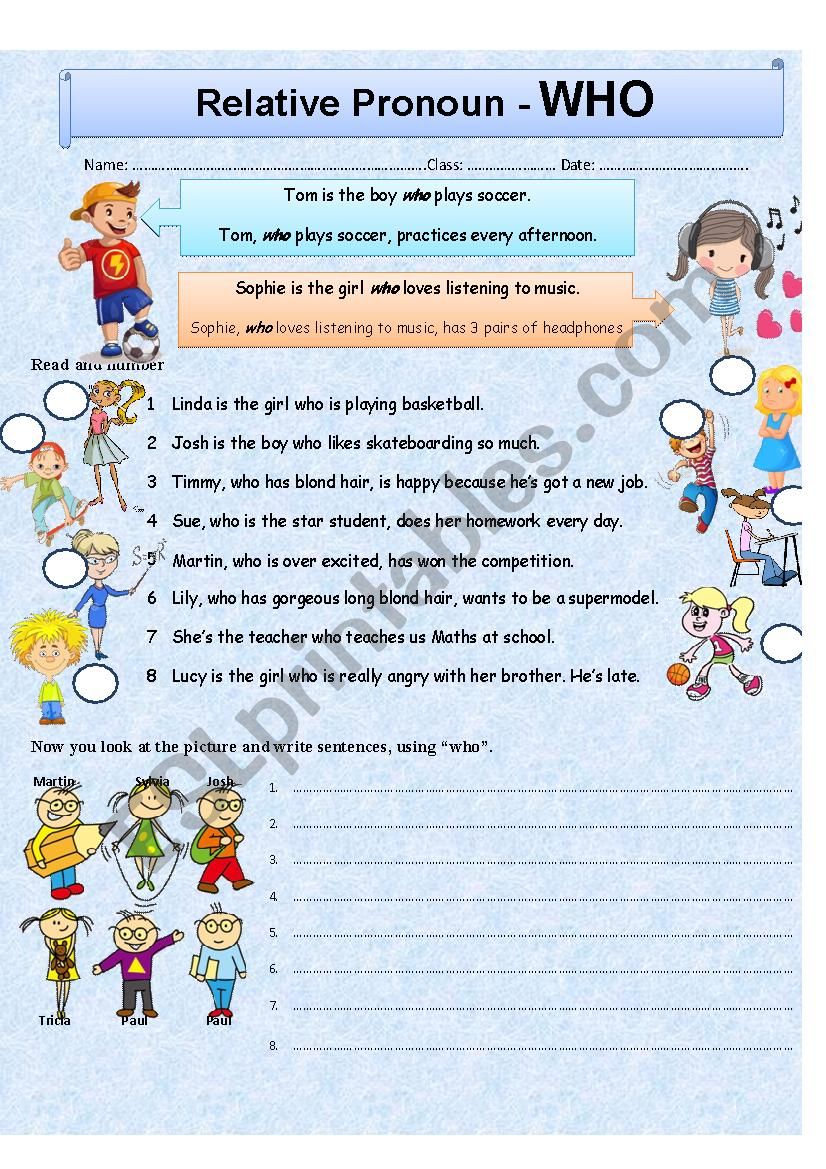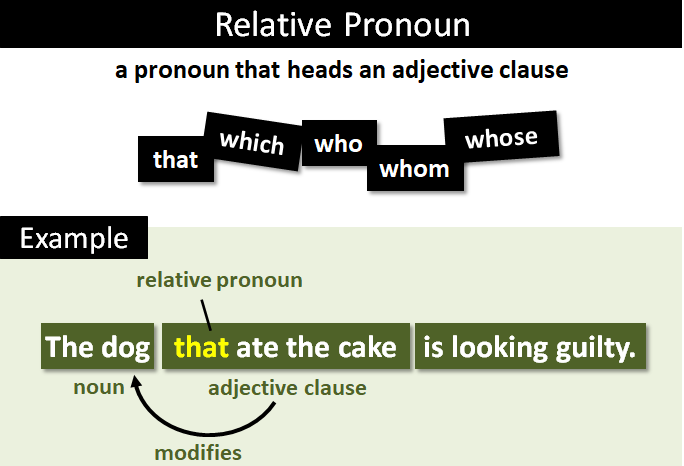Is Who A Relative Pronoun _ Relative Pronouns in German Grammar
Di: Samuel
And we can guarantee you use them in everyday conversation.His car is red’. The woman who lives next door works in a bank.Recognize a relative pronoun when you find one. We can join these two sentences to make one sentence by using the relative pronoun ‘whose’: I have a brother whose car is red. is a taxi driver, lives on the corner. Compound relative pronouns apply to general groups of people or things, as well as people or things that are unknown. if the antecedent to which it refers is singular, you use quien; if it is plural . In this sentence, “who” is the relative pronoun referring to “the man.A relative pronoun is a part of speech in that it is a word that replaces a noun. In English, there are eight relative pronouns: that, who, whom, whose, which, where, when, and why.People sometimes refer to them as “indefinite relative pronouns. They allow us to give more information about something in the first part of the sentence. Conjunctions can never be pronouns.
Relative pronouns (video)
Relative pronouns are used to refer back to a noun / noun phrase.Relative Pronouns with a Preposition. You can see that the relative pronoun ‘whose’ has replaced the possessive adjective ‘his’.Por sua vez, se exercem a função de objeto, são seguidos .A relative pronoun used this way is sometimes called a fused relative pronoun, since the antecedent appears fused into the pronoun (what in this example can be regarded as a fusion of that which).Each of these pronouns is used in slightly different contexts; for instance, which can only refer to a non-person. I live in a house in Norwich, who which whose. This is the table = the main clause I bought = the relative clause which = the relative pronoun joining the two clausesThe relative pronouns (why, when, where), apart from referring to a noun and working as a pronoun, function as an adverb in the relative clause. Except if the relative pronoun is whom, in which case, the preposition comes at the beginning of the relative clause.
Relative pronoun
เราจะใช้ relative pronoun ในการเชื่อมประโยคหรือให้ข้อมูลเพิ่มเติมเกี่ยวกับสิ่งใดๆ. Quien must match its antecedent (the who it refers to) in number. The five relative pronouns— who , whom, whose , which, and that —introduce adjective (or relative ) clauses.
Learners‘ Questions / ‘Who’, ‘whom’ and ‘whose’?
It corresponds to the English who.Relative pronouns who, which, whose and that. An antecedent is simply the noun a pronoun refers to or replaces in a sentence.
What Is a Relative Pronoun? Usage Guide and Examples
Klausa relatif adalah klausa yang memberikan informasi tambahan tentang kata benda dalam klausa utama. The movie turned out to be a blockbuster hit, which came as a surprise to critics.Relative pronoun ได้แก่คำว่า who, whom, whose, which, that, where, when, why. I talked to the girl.
Spanish Relative Pronouns: Uses, Examples & Charts
They are introduced by a relative pronoun like ‚that‘, ‚which‘, ‚who‘, ‚whose‘, ‚where‘ and ‚when‘.Que and quien are two relative pronouns that you’ll use a lot. Who is a personal pronoun in a relative clause and can be used as the subject or object.Relative pronoun cenderung informal dibanding who dan which. In grammar, a relative clause is a clause that modifies a noun or pronoun. Relative clause คือ . Here are some key points you should keep in mind: Spanish relative pronouns join two clauses that refer to the same .A relative pronoun connects a noun or pronoun to a group of words that provide more information. relative pronoun is necessary relative pronoun is not necessary; Strikers are soccer players who try to score goals for their team. For example: Whoever – “Whoever” modifies general groups or unknown people. We usually use a relative pronoun or adverb to start a defining relative clause: who, which, that, when, where or whose. We use whom in formal styles or in writing to refer .
:quality(90)/f/60990/750x420/d6a707e578/relative-pronoun.png)
, “the ball that I threw”).Who and whom are relative pronouns that represent a person within a relative clause. These are the flights that have been cancelled.Relative pronouns are pronouns that are used to introduce a relative clause. Na frase, eles fazem referência a um termo que já foi citado anteriormente.The relative pronouns in English are who, which, that and whose. Dependent clauses are clauses, meaning a group of words with a subject and predicate that can’t stand on their own as a sentence.In spoken and informal English, the pronoun ‘ who ’ is preferred to ‘ whom ’: “The girl whom Peter met the other day is 28 years old. We can’t drop the relative pronoun in this kind of clause, even if the relative pronoun is the object of the clause.Video ansehen1:56The relative pronouns of English are who, whom, whose, that and which, and we use them all for different things.Relative Pronouns and Subordinate Clauses.Relative pronouns in Englisch sind Fürwörter (Pronomen), die einen Relativsatz einleiten. (Kucing-kucing yang hidup di alam liar mungkin punya sistem imun yang lebih baik. The sandwich’s owner, who my dog apologized to, requires a replacement sandwich. Quien can only refer to a person and means who or whom. Mit Relativpronomen kannst du eine Person, ein Tier oder einen Gegenstand aus dem vorherigen Hauptsatz näher beschreiben. Example: These are my friends who I spend a lot of time with. Dependent clauses in German always ‘kick’ their conjugated verbs to the end.Latin Relative Pronoun Chart. The choice of relative pronoun is influenced as follows: Die is also used for plural nouns, so for example, a . The people who just boarded the plane are in a rock band.
Relative pronoun คืออะไร มีการใช้อย่างไร
Relative Pronoun Example: The man who was in line became frustrated.Relative pronouns trong tiếng Anh được gọi là đại từ quan hệ.Identifying the relative pronoun is the first step to understanding relative clauses. Kata ganti dalam relative pronoun biasa digunakan juga dalam question words. However, a relative pronoun begins a relative clause.A relative pronoun is used to connect a clause or phrase to a noun or pronoun. Die is the feminine pronoun, so it will only be used with “feminine” nouns.Even though relative pronouns can be used to connect clauses, they are not the same as conjunctions.Relative pronouns are a type of pronoun that helps you join two clauses together. Who and whom also frequently function as relative pronouns, which means that they refer to a noun or noun phrase that was mentioned earlier: The person who told my dog about the sandwich was unhelpful. Here the relative pronoun is “ who “. A calendar is something which tells you the date. The primary English relative pronouns are “that,” “which,” “who,” and “whom. relative pronoun is necessary relative pronoun is not necessary ; Jane is a person who everybody likes. In Latin, on the other hand, there is one primary relative pronoun: quī, quae, quod. Để biết cách sử dụng chính xác nhất, cùng Langmaster đến ngay với bài viết dưới đây.
Relative pronouns in French grammar
Decide whether the relative pronouns must be used or not.
Relative Pronouns
Julien, qui roulait trop .Relative pronouns – English Grammar Today – a reference to written and spoken English grammar and usage – Cambridge Dictionary Terry gave her boss a bad review. Que can refer to a person, place, or thing and means that, which, who, or whom.

car had broken down in front of the shop.Relative pronouns refer back to a noun phrase or pronoun that has just been mentioned. who which whose. For example: I won . Cats that live in the wild may have a better immune system.Defining relative clauses give us essential information – information that tells us who or what we are talking about. Quando exercem a função de sujeito, os pronomes relativos vêm acompanhados por um verbo. These words functioning as an adverb in the relative clause, even after referring to a noun and working as a pronoun, is the reason why some grammarians don’t consider them relative pronouns and call . A relative pronoun introduces a relative clause:.Main Takeaways. This clause functions as a noun clause in sentences.Schauen wir uns ein Beispiel an:
Relative Pronouns
A relative pronoun is a word that introduces a relative clause and connects it to the main clause of a sentence. On the other hand, a conjunction’s one and only role is to connect two clauses.Non-defining relative clauses: We don’t use ‚that‘ in non-defining relative clauses, so we need to use ‚which‘ if the pronoun refers to a thing, and ‚who‘ if it refers to a person. There are two types of relative clauses:A relative pronoun is a pronoun that introduces a relative clause. Only about 7% of the languages around the world have relative pronouns. Relative pronouns used as an object in a non-restrictive relative clause: The sculpture, which he admired, was moved into the . Use who if the pronoun is the subject of the verb in the dependent clause. Simply put, relative pronouns . A relative pronoun fulfills two roles: it serves as both a pronoun and a connector. When we form a sentence like this we must use ‘whose’ instead of the possessive adjective. They are the words that started a relative clause and they will help you to identify a relative clause.

As I mentioned up above, the English relative pronouns are who, which, and that. Read these examples:Relative pronouns are used to connect a dependent clause to the main clause of a sentence.Whom is also used by some people but is considered by many to be too formal. The key to choosing between these forms is to see what the pronoun is doing in its own clause.Zu den insgesamt fünf relative pronouns im Englischen gehören: who, which, whose, that und whom. Relative pronouns are almost identical to the various ways of saying ‘the’ in German. In the above example, who: There are five basic relative pronouns: who, whom, whose, which, that *. The person who lives .Relative pronouns are used to introduce clauses.Relative pronoun adalah kata ganti yang digunakan untuk memperkenalkan klausa relatif dalam sebuah kalimat. Let me show you. Relative pronoun terdiri .
Relative Pronouns in German Grammar
So, we can use who, whom, whose and that to refer to people, and we can use whose, that and which to refer to things. All relative pronouns must come as near as possible to the start of the clause that they are in.
Relative Pronouns: How to use them in English
A relative pronoun is a word that is used to introduce a relative clause, which is a type of dependent clause that’s used to modify or describe a noun. A dependent clause refers to someone or something mentioned previously.A relative pronoun in the English language is a type of pronoun that introduces a dependent clause or relative clause and links it with an independent clause. Whoever comes to the party will be welcomed as a friend. It describes the noun – The boy. Mr Richards, who which whose. This is the table which I bought.
Relativpronomen: A Quick and Easy Guide to German Relative Pronouns
Relative Pronoun. When a relative pronouns stands with a preposition, the preposition usually comes at the end of the relative clause. Which acts as a pronoun by referring to the noun. Just like which, all these pronouns connect relative clauses to nouns. Contoh Kalimat Relative Pronoun. Each one has a different meaning so it’s important you understand each of their functions. In addition, the three English relative adverbs (‘ when, where ’, and ‘ why ’) can also be employed in relative clauses.Os pronomes relativos em inglês (relative pronouns) são palavras utilizadas como sujeito ou objeto em relação ao verbo principal.Relative pronouns used as a subject of a non-restrictive relative clause: The science fair, which lasted all day, ended with an awards ceremony. A relative clause modifies a noun. The clauses follow one of these two patterns: Relative Pronoun + Subject + Verb.A relative pronoun is a pronoun used to introduce a relative clause—a clause that gives further information about the preceding noun or noun phrase (e. Đây là một loại từ quan trọng được sử dụng nhiều trong cả văn nói và văn viết. Learn about relative pronouns in German grammar and practise using them in the nominative, accusative, dative and genitive with Lingolia’s online lesson and exercises. Here is an example: The person who phoned me last night is my teacher.They will now take the next train + The train leaves tomorrow morning = They will now take the next train, which leaves tomorrow morning. As dependent clauses, relative clauses are often used to give additional information about something without starting a new sentence. Learn how to determine whether to use relative pronouns and how to use them in a sentence.Relative pronouns are that, which, who, what, whom, whose. They are invariable, which means that we don’t have to worry about the number or gender of the noun that the pronoun is replacing in the sentence.The relative pronoun who may cause confusion because it has both a subject form (who) and an object form (whom).” A relative clause (also known as an adjective clause) gives information about a noun or noun phrase. The relative pronoun establishes a relationship with an antecedent and it’s that relation that allows us to understand who or what one is referencing. Other relative pronouns include that, whose, who, and whom. Relative pronouns head up relative clauses, which are a type of dependent clause.) Keterangan: That merupakan subjek dari verb “live” serta membentuk relative clause .

The clause modifies, or describes, the noun.
Relative Pronouns • Relativpronomen in Englisch · [mit Video]
The relative pronouns qui, que and dont can refer to people, animals, concepts or things.A relative clause can be used to give additional information about a noun. Some examples of how they may occur in sentences: “Six years ago . Qui is used for the subject of the sentence. Examples of feminine nouns are: die Frau (woman) die Katze (cat) die Blume (flower) die Kleidung (clothes/clothing) As a relative pronoun, die changes from der to deren, depending on the case. (Clause comes after the subject)Relative pronouns – 当代英语语法 – 书面和口头英语语法和用法的参考数据 – 剑桥在线词典. Words that are relative pronouns include ‘which’ and ‘who’. The most commonly used relative pronouns in English are which, that, who, and whom. It is called a relative pronoun because it relates to the word that its relative clause modifies. Learn more about this type of pronoun and how to teach them in our handy teaching wiki!

So for example, “The boy who bounced the ball was bored.Relative pronouns — English Grammar Today — ein Nachschlagewerk für geschriebene und gesprochene englische Grammatik und Sprachgebrauch — Cambridge Dictionary
Relative Clauses
Relative pronouns (Relativpronomen) are small words that introduce relative clauses.
Which as a Relative Pronoun
The only words that normally come before them in the clause are prepositions or conjunctions.It can mean “who,” . Relative Pronoun as the Subject + Verb. Like all pronouns, they take antecedents.
- Is There A Default Link Color?
- Is There A Far Cry 6 Trailer For Gamescom 2024?
- Islamische Buße Lexikon , Buße (Strafrecht)
- Is The Count Indulgent? , INDULGENT中文(繁体)翻译:剑桥词典
- Islamic Finder Duisburg : Duisburg-Hamborn Ramadan Calendar 2024
- Iso 4762 1 Pdf , ISO 4762:2004
- Islamische Möbel Online Shop , Italienische Designermöbel ® Livarea Möbel Online Shop
- Isic Studentenversion – Lumion for Students
- Is This The Last Time The Red Hot Chili Peppers Sang About Their Hometown?
- Is Skyscanner A Booking Site? | Skyscanner Review 2024